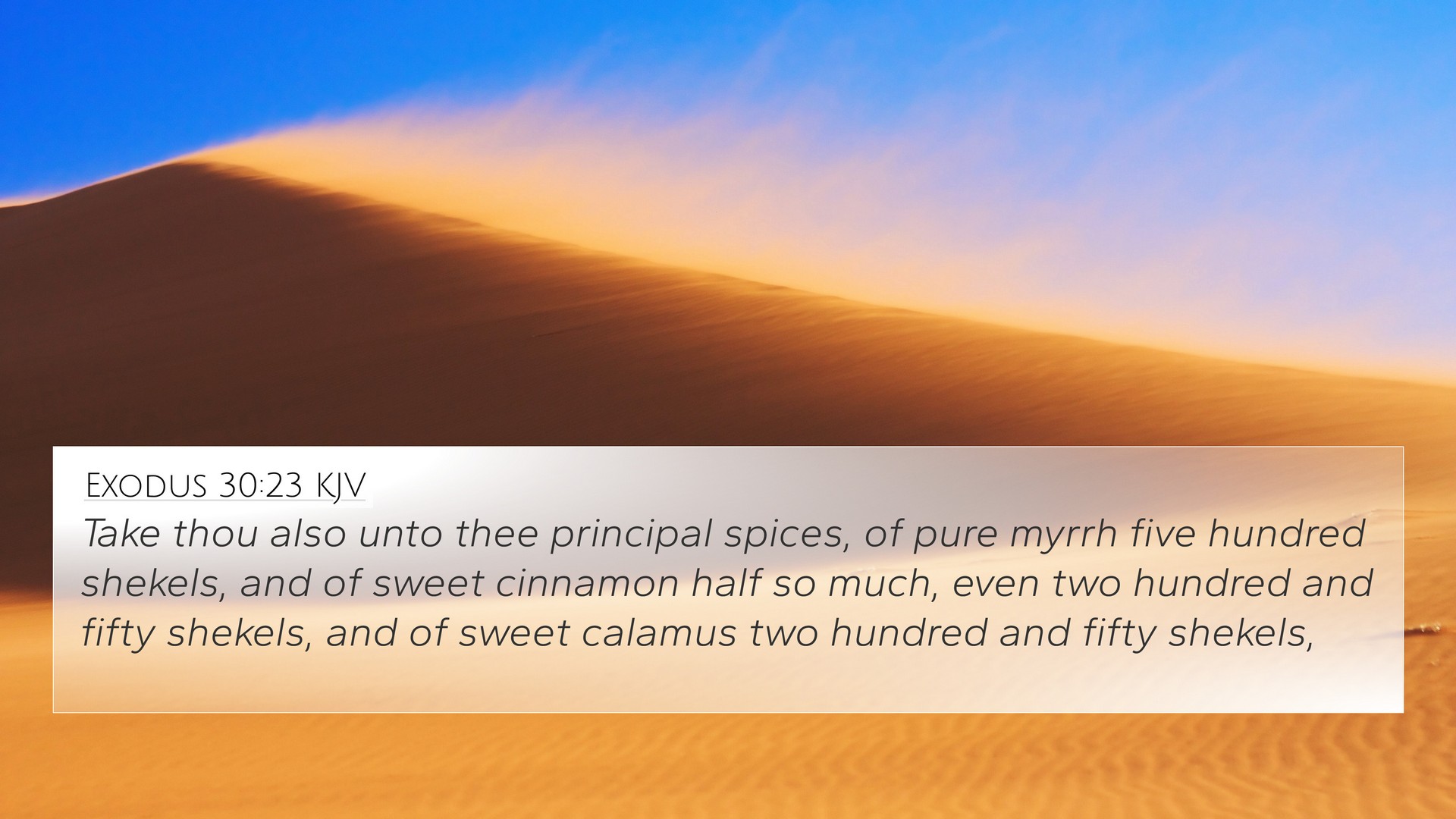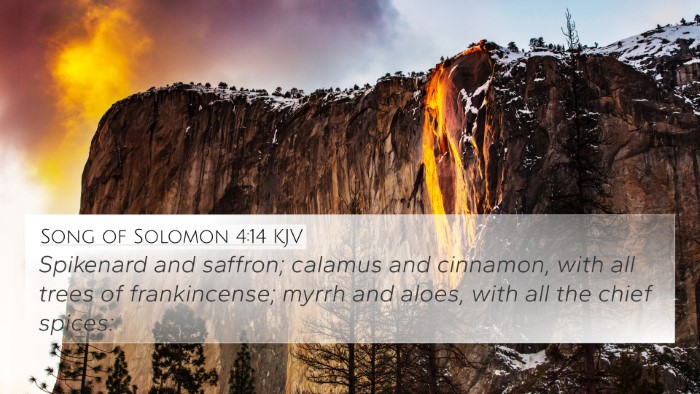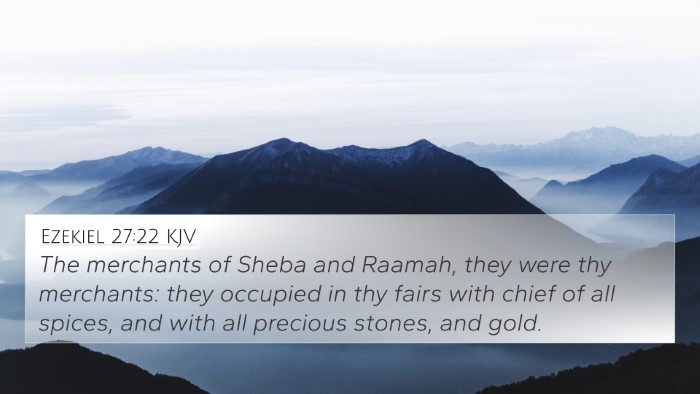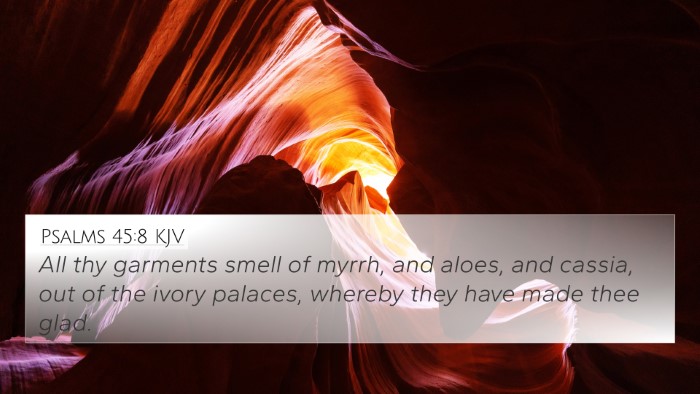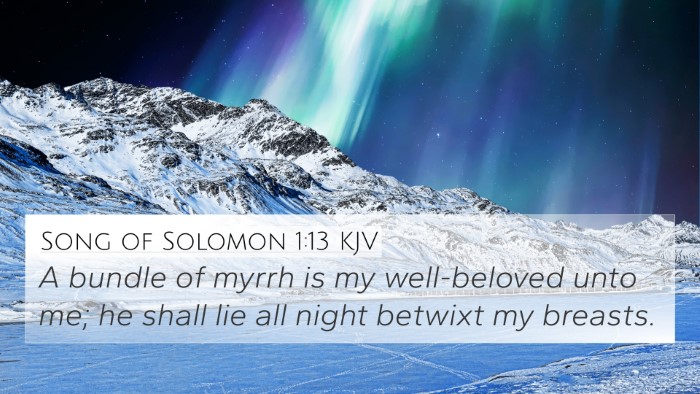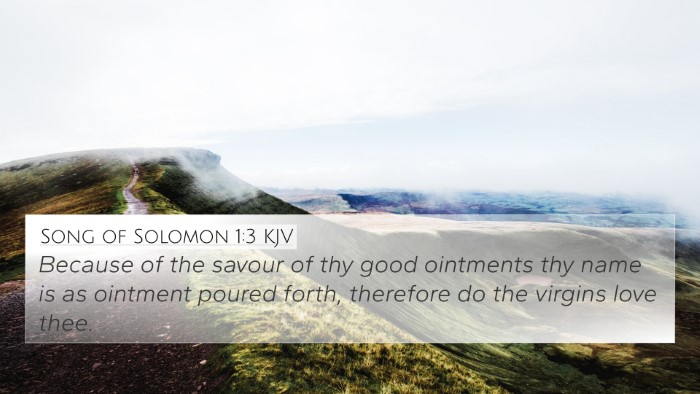Meaning and Interpretation of Exodus 30:23
Exodus 30:23 states: "Moreover, take thou also unto thee principal spices, of pure myrrh five hundred shekels, and of sweet cinnamon half so much, even two hundred and fifty shekels, and of sweet calamus two hundred and fifty shekels." This verse details God's instruction to Moses regarding the anointing oil for the tabernacle and the importance of the specific ingredients used.
Commentary Insights
This passage, rooted in the Old Testament, highlights the meticulous nature of worship and the significance of the components that comprise the holy anointing oil. It reveals God’s concern for purity and intentionality in worship practices, an idea echoed throughout various biblical texts.
Matthew Henry's Commentary
Matthew Henry emphasizes the symbolic nature of the components used in constructing the anointing oil. The specific spices, like myrrh and cinnamon, represent attributes of Christ and the fragrance of worship that rises to God. Myrrh symbolizes suffering and sacrifice, while cinnamon may reflect the sweetness of worship.
Albert Barnes' Commentary
Albert Barnes notes the importance of the anointing oil not just for practical purposes, but as a divine command essential for the sanctification of the priests and the tabernacle. This oil, he explains, was not to be replicated casually, indicating the holiness and exclusivity of God’s directives.
Adam Clarke's Commentary
Adam Clarke adds depth by discussing the historical context and the significance of each ingredient. Clarke elucidates that these elements were intended to produce a holy anointing, underscoring the seriousness of entering into the presence of God and the importance of achieving a state of purity and dedication when engaging in worship.
Cross-References for Exodus 30:23
- Exodus 25:6 - "Oil for the light, spices for anointing oil, and for sweet incense."
- Exodus 29:7 - "Then shalt thou take the anointing oil, and pour it upon his head, and anoint him."
- 1 Samuel 10:1 - "Then Samuel took a vial of oil, and poured it upon his head, and kissed him."
- Psalm 133:2 - "It is like the precious ointment upon the head, that ran down upon the beard, even Aaron's beard."
- Matthew 26:6-7 - "Now when Jesus was in Bethany, in the house of Simon the leper, there came unto him a woman having an alabaster box of very precious ointment, and poured it on his head."
- James 5:14 - "Is any sick among you? let him call for the elders of the church; and let them pray over him, anointing him with oil."
- Revelation 8:3 - "And another angel came and stood at the altar, having a golden censer; and there was given unto him much incense, that he should offer it with the prayers of all saints upon the golden altar which was before the throne."
Connections Between Bible Verses
This verse is significant as it connects to various theological themes throughout the Bible such as anointing, sanctification, and the usage of oils in sacred rites. By examining these connections, readers can deepen their understanding of how the Old and New Testament dialogues about worship, purity, and divine appointment.
Thematic Bible Verse Connections
We can observe a thematic link between Exodus 30:23 and the actions of Christ during His ministry, as the use of oils and anointing is consistently reflected throughout scripture. The anointing of Jesus and the instructions provided in Exodus manifest God's ongoing revelation of Himself to humanity.
Inter-Biblical Dialogue
The discourse surrounding the sacred anointing oil in Exodus invites a deeper exploration of the practice of anointing found in the New Testament. For instance, the pouring of precious ointment on Jesus showcases the ultimate fulfillment of these earlier traditions in the context of Christ's redemptive work. This highlights the continuity of God's purpose throughout the scripture.
Tools for Bible Cross-Referencing
For those looking to explore the connections found in scripture, employing tools such as a Bible concordance or a Bible cross-reference guide can enhance your study significantly. These resources allow you to identify themes and verses that relate to one another, making your understanding of Biblical principles more cohesive.
Conclusion
Exodus 30:23 serves as a reminder of the importance of following God's commands meticulously when it comes to worship. Understanding the significance of the specific ingredients used in anointing oil allows for richer insights into God's character and expectations for offerings made to Him. Additionally, by cross-referencing this verse with others, one can appreciate a deeper theological commitment that spans the entirety of the Biblical narrative.
